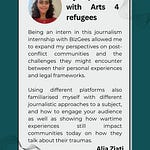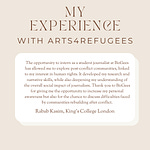How ISIS divides societies: the Re-displacement of Sunni Muslims in Mosul, Iraq
Sunni IDPs around Mosul
Since the defeat of ISIS in 2017 in Mosul, Northern Iraq, most refugee camps have closed as life returns to normal. However, many Sunni Muslims wish to stay in these camps because they fear they don’t belong in their former city. According to the United States’ International Religious Freedom report 2022, 1.2 million Iraqis remained displaced within Iraq, with 665,000 in the north, 40% being Sunni Arabs. The report also indicates that Sunnis account for about 90% of prisoners and 9,000 death sentences out of 11,000 since 2014.
Why do Sunni Muslims struggle to see a future in post-war Mosul, despite being the majority?
A Vicious Cycle of Revenge and Exclusion
Iraq, especially Mosul, has suffered from two authoritarian rules and civil wars in the last 50 years. This extreme violence has caused deep trauma and division, leading to sectarian identities based on bloodshed. The exclusion of Sunni Muslims is often due to their association with ISIS and Saddam Hussein’s Baathist party, both Sunni movements.
The regimes’ actions and repression caused sectarian tensions and distrust towards Sunnis. Saddam’s regime (1979-2003) was responsible for over 290,000 ‘disappearances’ and the genocide of Iraqi Kurds (Human Rights Watch), and ISIS killed over 5,000 in its genocide and tortured and killed many Iraqis during its Shariah law enforcement from 2014 to 2017. Sunni Arabs are now associated with these mass killings, regardless of their individual actions.
The negative associations have ostracised Sunnis, who are amalgamated with ISIS-supporters and divided the community. For most Sunni Moslawis, this means their human needs for esteem and belonging are met with contempt and rejection, depriving them of safety, shelter, water, and food. Identifying the causes and consequences of this denial of Sunni Muslims IDPs’ needs requires understanding the recent history of this community, from Saddam’s execution in 2003 to the reclaiming and rebuilding of Mosul since 2017.
The 2003 US Invasion of Iraq and ISIS’ Rise to Power
After the US executed Saddam Hussein in 2003, the new Iraqi state purged his party’s supporters, the Sunni Baathist party, affecting Mosul, a stronghold. This transition left thousands of Sunni Muslims jobless and without services. The Iraqi army disbandment left many armed men unemployed. The US left the country without a post-Saddam plan, leading to former soldiers forming militias and Baathist workers losing income and status, leading to a civil war from 2006 to 2009. In 2011-2013, the Arab Spring took over Sunni Mosul in protests against the government’s counter-terrorism legislation. Al-Qaeda in Iraq (AQI) capitalized on Sunni Muslims’ grievances, leading to the birth of ISIS, sparking a second civil war from 2013 to 2017.
Surprisingly, when ISIS took Mosul in 2014, they were initially welcomed by locals. After the civil war, Sunnis were frequently arrested by government checkpoints, and the lack of local administration limited access to electricity and clean water. ISIS gained popular support by improving infrastructures, removing checkpoints, and subsidizing bread and fuel.
Organizations like AQI and ISIS promote the expansion of an extremist branch of Sunni Islam, Salafism, advocating for the enforcement of Islamic law (sharia) through armed struggle (jihad). Under ISIS’s caliphate, which expanded from North and East Syria to Northern Iraq, any behaviour opposed to sharia would be severely reprimanded. Most Sunnis in Mosul did not follow Salafism, and suffered from ISIS’s rule. As a result, ISIS rapidly lost popular support due to its extreme violence.
The Liberation of Mosul
In 2016-2017, Iraqi armed forces, Shia militias, and a US-led coalition recaptured Mosul from ISIS. Both sides committed human rights violations, killing an estimated 10,000 civilians. Violence against Sunni Muslims was intense as they were suspected of collaborating with ISIS. Identification was challenging and few citizens were granted a fair trial. Tribal law in Iraq held whole families accountable if one member was affiliated with ISIS.
This is still true for Sunni IDPs and a main reason why they fear returning. Most Sunni men have been imprisoned or executed by the armed forces, leaving mostly women and children in camps. The tribal system attributes collective guilt to the families of those accused of collaborating with ISIS, allowing other groups to revenge on these Sunni IDPs. In a cycle of violence, Yazidi militias, nearly exterminated by ISIS, also commit crimes against Sunnis who refuse to return home. Most Sunnis are displaced because they lost their sense of belonging in their home-city.
Consequences of Sunni IDPs’ Loss of their Sense of Belonging
Belonging is a basic human need that affects fulfillment of other needs like safety, medical care, heating, food, or water, which are scarce in camps and shanty towns. Most Sunni Muslims’ legal documents were lost in the war or confiscated by militias, denying them access to critical infrastructure like administrative buildings, hospitals, and schools. This affects their ability to satisfy these needs. Children born after 2014 lack government-issued papers, like birth certificates, meaning they are not registered as Iraqi citizens.
IDPs need identity papers to reintegrate society, but it’s hard for Sunni Muslims to obtain them. Women hesitate to request these documents due to the risk of sexual harassment during the bureaucratic process. For Sunni women with husbands accused of ISIS affiliation, the first condition to request these papers is to disavow their husbands. Being considered affiliated to ISIS is common, as it was the state authority in Mosul for three years and a main employer. Even their drivers, cooks, and cleaners were imprisoned, causing wives hesitate. Choosing to divorce is seen as proof of ISIS affiliation, exposing families to revenge killings.
National and International Reconstruction Efforts
In this context, although camps may seem secure, they are not a viable long-term solution. The Iraqi state has started closing camps since 2020 and focused on rebuilding East Mosul, with motorways, hospitals, schools and parks being restored. The international community’s efforts have been directed towards rebuilding cultural religious sites, such as churches and mosques, notably the 12th century Al-Nouri Mosque.
The United Nations High Commissioner for Refugees (UNHCR) has adapted its response to the Iraqi crisis by adopting a development-focused approach rather than a humanitarian one. The remaining needs of forcibly displaced populations in Iraq are driven by socio-economic factors, human rights deficits, and the absence of the rule of law rather than their displacement status. The UNHCR acknowledges the main challenge for Sunni Arabs is being perceived as affiliated to ISIS, leading the UN to promote “refugee inclusion in social programmes and improving refugees’ access to labour markets and livelihood opportunities” to alleviate stigmatization.
The Risk of a Third Civil War in Iraq
Failure to reintegrate Sunnis in Iraqi society would worsen their living conditions and risk sparking a third civil war. Belkis Wille of Human Rights Watch states, “it builds anger and resentment in a country that carries out collective punishment and punishes innocent women and children.” For Sunni Muslims, residing in camps and shanty towns stigmatizes them as ISIS collaborators and exacerbates social stigma. Concentrating displaced populations breeds anger that ISIS could exploit. After 2003, the US held tens of thousands of Iraqi insurgency members in camps, and nine of them later formed the leadership. Prolonged detention fosters radicalization, and failing to fulfill Sunni IDPs’ need for belonging could spark a third civil war in less than twenty years after the first.
In this article Gaëlle discusses the post conflict region of Iraq. She is a student journalist with us on a placement organised by the Department of War Studies, King's College, London. This article was edited using Lex.page.
Thank you for your time. Don’t forget to share A4R 🎨 Media Hub. Every share helps.














